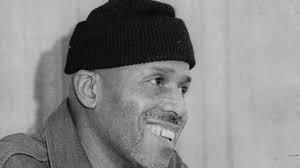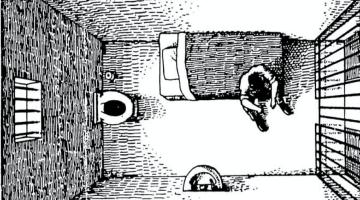Tiyo Attallah Salah-El’s exemplary life (without parole) is testament
to the human spirit and the cause of abolition.
“We learn a lot about the realities of prison, see a stellar example
of a wonderfully productive life.”
(OR Books, New York and London). 240 pages.
E-book version, read by the actor Carl Weathers:
ISBN 97816821930
This inspiring book consists of a selection of 92 of the 568 letters prisoner Tiyo Attallah Salah-El sent out to Paul Alan Smith over the course of l4 years—and that was just one of Tiyo's richly engaged correspondences. In the course of reading it, we learn a lot about the realities of prison, see a stellar example of a wonderfully productive life despite all kinds of obstacles, and feel the passion for social justice.
Tiyo was incarcerated in 1975 in Pennsylvania, where 60% of the prisoners are Black or Latinx. Pen Pal is not about his case, and we only learn in passing that it involved drugs, guns and murder, and that he is ashamed of the person he was then. He's sent to SCI-Dallas, a prison built to house 950, but that ends up holding 2,480, and is placed on "slow death row," the unit for 453 lifers, with little or no chance at all for parole. Pennsylvania holds 5,370 such people. He remained there until he died in 2018, at the age of 85. On slow death row Tiyo formed deep friendships with Phil and Delbert Africa, of the revolutionary Black liberation and environmental MOVE organization. Mike Africa, Jr., the son of two other MOVE activists who each did four decades in prison, wrote the touching preface to this book.
“Tiyo remained on slow death row until he died at the age of 85.”
While Pen Pal is not at all an effort to provide a detailed picture of prison life, Tiyo's various references in passing give the readers a better sense of the realities than I've been able to do even with direct descriptions. We feel life in a 5' by 8' cell, where you never sleep next to a loved one, and the cold before the heat gets turned on on November 1, or the high 90 degrees when the block bakes in July. There's the censorship, whereby he can't even receive a book on prison abolition that includes one of his essays. We're reminded of the frequent lock-downs where you're in your cell for the duration, eating peanut butter sandwiches, and hoping that the SWAT team doesn't trash your cell too badly. Tiyo could expect the worst as he was listed as a "political educated trouble maker"; one time the guards searching his cell called him "a smart nigger!" We read about Tiyo stopping a rape, advocating for gay rights, sitting with a dying prisoner in hospice. We also get glimpses of the overall brutalities of beatings, suicides, medical neglect.
In April, 2005, he wrote of 14 deaths during the preceding two months.
Perhaps the hardest part of prison is not being there for loved ones during trauma or death. Here it’s most vivid with Tiyo’s older sister, Bette, who had always been his champion. Once she had a debilitating stroke, he had no way to even talk with her on the phone, let alone care for her and hold her hand from her illness to her death.
“He can't even receive a book on prison abolition that includes one of his essays.”
But overall this is not at all a grim book. His letters are laced with a jaunty sense of humor and affection for Paul. And emotional support, as we see a number of times, does not have to be a one-way street; the prisoner can have something to give too. We see this most poignantly when he writes Paul, "I am hurting deep within the marrow of my bones because I know you are hurting due to the passing away of your father."
Tiyo's accomplishments from inside that 5' by 8' cell--despite all the lockdowns, prison violence and his health issues, which became increasingly severe as he aged--are nothing short of spectacular. He earned a B.A. and then a master’s degree; was a jazz musician, not only playing the sax but also writing music and organizing in-prison shows; did effective work as a jailhouse lawyer; had several essays published (he also wrote an autobiography, but for friends to read, not for publication); and was a founder of the Coalition for the Abolition of Prisons (CAP).
The talent and determination that went into those accomplishments are dazzling. But from these letters we can see that what meant the most to Tiyo was the superb work in prison education.
Only 8% of Dallas-SCI's prisoners had a high school degree or its equivalency (by passing a GED exam). Tiyo set up a tutorial program, first with four prisoners. When that was a striking success, he got over a hundred new requests -- this in a program with no official sanction or help, where his outside correspondents provided the funds for school supplies.
“What meant the most to Tiyo was his superb work in prison education.”
Tiyo was always conscious of the need to develop new leadership. Once those seeking help surpassed 100, he trained and developed previous graduates to become tutors, putting them in teams of two to lead four or five groups of 20 to 25 students each. Over the course of four years, 280 men entered the program and 242 got their GEDs. (He later wrote a GED handbook to help those at other prisons to set up similar programs.) Some of his graduates went on to college. Tiyo also saw a remarkable change like what I noticed in the men I trained to become AIDS educators in the 1980s and 90s: people feel a lot better about themselves when they find a way to do something worthwhile with and for other people. The negative ways of proving oneself go way down and the enthusiasm for contributing to the community goes way up.
While the in-prison tutoring program and the outside CAP organization (I would have liked to see an appendix that described its work) may seem to be two very different realms, they're really two halves of the same whole: when we call for abolition it's because we need to replace the terribly destructive punishment paradigm with the resources and programs that allow the best in people to flourish, that move in the direction of community development, control and self-determination for the oppressed.
The last words of this review will be Tiyo's, from the very brief excerpt from his autobiography appended to these letters: "...[U]nless major cultural and political changes are made not only in regard to the prison-industrial complex and criminal justice system but also the reconstruction of the social, economic, and political policies for the benefit of all races, genders, sexual preferences, and workers of all kind... the United States is headed towards catastrophe and tragedy." That 2006 warning is not written in the spirit of defeatism but very much from someone who also says, "I choose to go in the direction of my dreams, and help bring about revolutionary change in the world."
David Gilbert has been incarcerated in New York State since 1981.
COMMENTS?
Please join the conversation on Black Agenda Report's Facebook page at http://facebook.com/blackagendareport
Or, you can comment by emailing us at comments@blackagendareport.com














